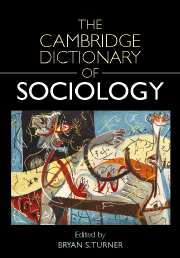T
Published online by Cambridge University Press: 22 October 2021
Summary
taboo
– see sacred and profane dichotomy.
talented tenth
A belief, developed in the nineteenth century, that society divides “naturally” into an elite who are innovative and imaginative and have a potential for leadership, and an inert mass who lacks these qualities.
The notion is elitist and pessimistic. People have all kinds of talents that are unrecognized by a society which privileges certain attributes and denigrates others. We have inherited a dualism between mind and body which needs to be challenged: a narrow and intellectualist notion of “talent” reinforces a disastrous underrecognition of manual skills and dexterity.
The talents that people have are the product of society, and are not simply attributes that we privately own. Reading and writing skills are hugely facilitated by a cultural background, a particular kind of education, parental role models, and so forth. The danger with the notion of a “talented tenth” is that it unwittingly encourages an abstract individualism and ignores the fact that skills derive from living in society and benefiting from relations with others.
The classical liberal view that everyone is free and equal is a premise to be concretized, not rejected. The “talented-tenth” argument assumes that the rest of society cannot govern their own lives. On the contrary, they require leadership and dynamism from “on high” to motivate them. This is not to pose an idealized order in which ultimately everyone will be able to do everything – but rather to suggest that recognizing different talents is part of a process of democratization that is ongoing and infinite in character.
JOHN HOFFMAN
Tarde, Gabriel (1843–1904)
An early advocate of social statistics and a founder of criminology, sociology, and social psychology, Tarde made many contributions that paved the way for recognition of the role of public opinion and mass media and communications in empirical research. Although Tarde was working between the schools of F. Le Play and Émile Durkheim, he enjoyed a wide public recognition (at the prestigious Colle`ge de France and in Chicago sociology) but his strong emphasis on individualism distanced him from mainstream French sociology.
- Type
- Chapter
- Information
- The Cambridge Dictionary of Sociology , pp. 622 - 642Publisher: Cambridge University PressPrint publication year: 2006



